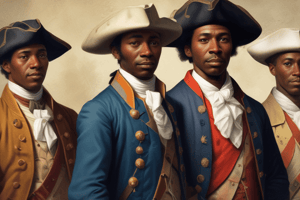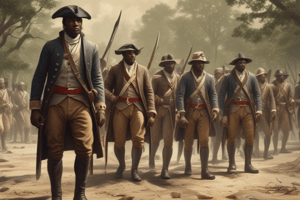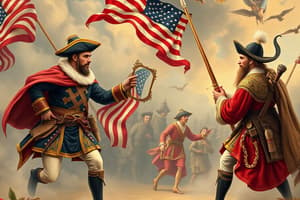Podcast
Questions and Answers
What role did slaves and free blacks play in the Revolutionary War?
What role did slaves and free blacks play in the Revolutionary War?
- They were not involved in the war at all.
- They mainly provided financial support.
- They only served as laborers behind the scenes.
- They participated directly as soldiers and as laborers. (correct)
Why is the mention of slaves and free blacks not common in history books regarding the Revolutionary War?
Why is the mention of slaves and free blacks not common in history books regarding the Revolutionary War?
- Their involvement was only limited to one incident.
- Their contributions were not properly credited. (correct)
- Their contributions were insignificant.
- They did not contribute at all.
What decision did General George Washington make regarding the enlistment of slaves and free blacks in the army?
What decision did General George Washington make regarding the enlistment of slaves and free blacks in the army?
- Prohibited them from enlisting, only allowing them to work as laborers. (correct)
- Offered them financial compensation for their service.
- Encouraged them to volunteer for militia service.
- Allowed them to enlist as soldiers.
Apart from slaves, who were free blacks in the American Colonies?
Apart from slaves, who were free blacks in the American Colonies?
How many free blacks and slaves are estimated to have directly participated in the Revolutionary War?
How many free blacks and slaves are estimated to have directly participated in the Revolutionary War?
In which year did the American Revolution begin?
In which year did the American Revolution begin?
What was the primary economic foundation of the Southern Colonies during the American Revolution?
What was the primary economic foundation of the Southern Colonies during the American Revolution?
Why were the Southern Colonies uneasy about the idea of slaves and free blacks fighting in the American Revolution?
Why were the Southern Colonies uneasy about the idea of slaves and free blacks fighting in the American Revolution?
What was a significant role played by free blacks and slaves during the American Revolution?
What was a significant role played by free blacks and slaves during the American Revolution?
In which colonies were free blacks more likely to fight in the American Revolution as valuable members of their society?
In which colonies were free blacks more likely to fight in the American Revolution as valuable members of their society?
Why did some slave owners offer the services of their slaves to fight in the American Revolution?
Why did some slave owners offer the services of their slaves to fight in the American Revolution?
What motivated many slaves to participate in the American Revolution?
What motivated many slaves to participate in the American Revolution?
What was a common fate for many slaves after the American Revolution?
What was a common fate for many slaves after the American Revolution?
How did British soldiers respond to slaves attempting to board their boats to escape after the war?
How did British soldiers respond to slaves attempting to board their boats to escape after the war?
What was General George Washington's stance on enlisting slaves and free blacks in the army during the American Revolution?
What was General George Washington's stance on enlisting slaves and free blacks in the army during the American Revolution?
In which century did slavery as an institution in the United States date back to?
In which century did slavery as an institution in the United States date back to?
How did the decision to allow free blacks and slaves to participate in the American Revolution vary across different regions?
How did the decision to allow free blacks and slaves to participate in the American Revolution vary across different regions?
What was the primary reason some Southern Colonies were hesitant about allowing slaves and free blacks to participate in the Revolutionary War?
What was the primary reason some Southern Colonies were hesitant about allowing slaves and free blacks to participate in the Revolutionary War?
Who did General George Washington specifically prohibit from enlisting in the army or volunteering for the militia during the American Revolution?
Who did General George Washington specifically prohibit from enlisting in the army or volunteering for the militia during the American Revolution?
Which individual, known for his involvement in the Boston Massacre, represents a rare mention of African-Americans' contributions to the Revolutionary War?
Which individual, known for his involvement in the Boston Massacre, represents a rare mention of African-Americans' contributions to the Revolutionary War?
What was the primary reason why Southern Colonies were reluctant to allow slaves to participate in the American Revolution?
What was the primary reason why Southern Colonies were reluctant to allow slaves to participate in the American Revolution?
Which region had a higher concentration of free blacks fighting in the American Revolution as valuable members of society?
Which region had a higher concentration of free blacks fighting in the American Revolution as valuable members of society?
What was a common role for both slaves and free blacks in the American Revolution?
What was a common role for both slaves and free blacks in the American Revolution?
Why did some slaves choose to join the British side during the American Revolution?
Why did some slaves choose to join the British side during the American Revolution?
What was a significant risk faced by slaves trying to escape by boarding British boats after the war?
What was a significant risk faced by slaves trying to escape by boarding British boats after the war?
What was a notable consequence for some slaves who chose to run away from their masters during the American Revolution?
What was a notable consequence for some slaves who chose to run away from their masters during the American Revolution?
In which region did British authorities enlist a regiment named the 'Ethiopian Regiment' consisting of runaway slaves?
In which region did British authorities enlist a regiment named the 'Ethiopian Regiment' consisting of runaway slaves?
Who was Colonel Tye mentioned in the text?
Who was Colonel Tye mentioned in the text?
Study Notes
Slaves and Free Blacks in the Revolutionary War
- Slaves and free blacks played a significant role in the Revolutionary War, with an estimated 5,000-8,000 directly participating.
- The mention of slaves and free blacks is often omitted in history books due to the complex and controversial nature of their involvement.
General George Washington's Decision
- General George Washington initially prohibited slaves and free blacks from enlisting in the army, later reversing this decision due to manpower shortages.
Free Blacks in the American Colonies
- Free blacks were individuals who had been freed or were born free, living in the American Colonies; they were not indentured servants.
Participation in the Revolutionary War
- Free blacks and slaves fought in the American Revolution, with some serving as valuable members of their society, particularly in the Northern Colonies.
Economic Foundation of the Southern Colonies
- The primary economic foundation of the Southern Colonies during the American Revolution was slavery and agriculture.
Unease in the Southern Colonies
- The Southern Colonies were uneasy about the idea of slaves and free blacks fighting in the American Revolution due to fears of slave uprisings and loss of property.
Significant Roles Played
- Free blacks and slaves played a significant role in the American Revolution, serving as soldiers, sailors, and spies.
Valuable Members of Society
- Free blacks were more likely to fight in the American Revolution as valuable members of their society in the Northern Colonies.
Motivations and Fates
- Some slave owners offered the services of their slaves to fight in the American Revolution in exchange for their freedom.
- Many slaves were motivated to participate in the American Revolution by the promise of freedom.
- A common fate for many slaves after the American Revolution was to remain enslaved, despite promises of freedom.
British Soldiers' Response
- British soldiers responded to slaves attempting to board their boats to escape after the war by capturing and returning them to their owners.
General George Washington's Stance
- General George Washington later supported the enlistment of slaves and free blacks in the army during the American Revolution.
Slavery in the United States
- Slavery as an institution in the United States dates back to the 17th century.
Regional Variations
- The decision to allow free blacks and slaves to participate in the American Revolution varied across different regions, with some regions being more open to their involvement.
Primary Reason for Hesitation
- The primary reason some Southern Colonies were hesitant about allowing slaves and free blacks to participate in the Revolutionary War was the fear of slave uprisings.
Prohibition on Enlistment
- General George Washington specifically prohibited women, Quakers, and Native Americans from enlisting in the army or volunteering for the militia during the American Revolution.
Crispus Attucks
- Crispus Attucks, known for his involvement in the Boston Massacre, represents a rare mention of African-Americans' contributions to the Revolutionary War.
Primary Reason for Reluctance
- The primary reason why Southern Colonies were reluctant to allow slaves to participate in the American Revolution was the fear of losing property and control.
Region with Higher Concentration
- The Northern Colonies had a higher concentration of free blacks fighting in the American Revolution as valuable members of society.
Common Role
- A common role for both slaves and free blacks in the American Revolution was serving as soldiers, sailors, and spies.
Joining the British Side
- Some slaves chose to join the British side during the American Revolution, hoping to gain freedom by fighting against their American colonial masters.
Significant Risk
- A significant risk faced by slaves trying to escape by boarding British boats after the war was being captured and returned to their owners.
Notable Consequence
- A notable consequence for some slaves who chose to run away from their masters during the American Revolution was being captured and sold to plantation owners in the West Indies.
The 'Ethiopian Regiment'
- British authorities enlisted a regiment named the 'Ethiopian Regiment' consisting of runaway slaves in the region of Virginia.
Colonel Tye
- Colonel Tye was a prominent African-American leader who fought alongside the British in the American Revolution.
Studying That Suits You
Use AI to generate personalized quizzes and flashcards to suit your learning preferences.
Description
Test your knowledge about the significant contributions made by slaves and free blacks during the American Revolutionary War. Explore the roles they played as soldiers, militia, and laborers, shedding light on their often overlooked involvement in shaping the outcome of the war.




